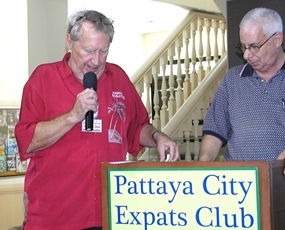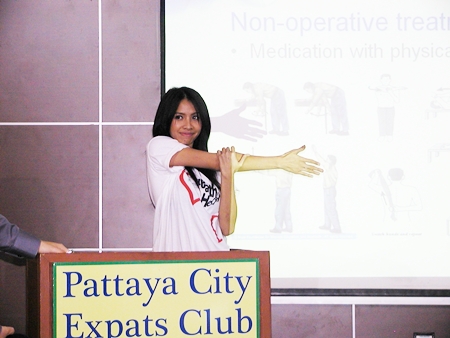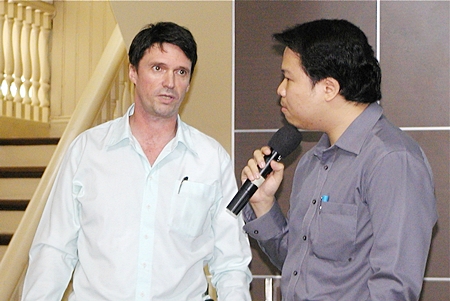The Pattaya City Expats Club (PCEC) did not get the “cold shoulder” at their Sunday, April 22 meeting; rather members and guests learned about a condition called “frozen shoulder.” Master of Ceremonies Richard Silverberg called on fellow member Gavin Waddell, international executive for Phyathai Hospital Sriracha to introduce the club’s speaker, an orthopedist from the hospital who specializes in shoulder conditions. Dr. Watanachai Bangkhen is also a specialist in sports injuries.
Dr. Watanachai described the condition of frozen shoulder which is also known as adhesive capsulitis. It is a common, painful condition that affects the ability to move the shoulder. It reduces normal movement in the joint and, in some cases, it can prevent movement in the shoulder altogether. Pain and stiffness in the shoulder are the most common symptoms.
 Member ‘Hawaii Bob’ awards the prizes of discounts & ‘2 for 1’s at Pattaya area restaurants to many PCEC members. MC Richard Silverberg looks on.
Member ‘Hawaii Bob’ awards the prizes of discounts & ‘2 for 1’s at Pattaya area restaurants to many PCEC members. MC Richard Silverberg looks on.
Dr. Watanachai said that it affects up to 2% of the population and is more likely to affect those that are 40 to 60 years of age and it affects women more often than men. It is caused by inflammation, which prevents the bones in the shoulder from moving freely. Strangely enough a lot of the time there is no known cause for frozen shoulder.
He explained that there are three stages of frozen shoulder. One is the “painful stage.” During this stage there is pain for any movement of your shoulder and the range of movement becomes limited. The next stage is called the “frozen stage.” Pain may begin to diminish; but the shoulder becomes stiffer and your range of motion decreases markedly. The third is the “thawing stage.” During this stage the range of motion begins to improve. For some, the pain worsens at night disrupting sleep. Going through these three stages can take up to 2 years.
He said that doctors really don’t know why this condition happens for some people and not others, but is more likely for those that have recently had prolonged immobilization of their shoulder such as after surgery or arm fracture. Also, certain medical problems appear to be prone toward development of a frozen shoulder such as: diabetes, over-under active thyroid, cardiovascular disease, tuberculosis, and Parkinson’s disease. Diagnosis includes being asked by your doctor to perform certain actions to check for pain and the range of motion. Other tests may also be performed such as X-rays and MRIs. These tests help to rule out other conditions causing the pain and lack in the range of movement.
 Dr. Bangkhen showed, with the aid of a nurse, some exercises that can help prevent and or repair ‘frozen shoulder’.
Dr. Bangkhen showed, with the aid of a nurse, some exercises that can help prevent and or repair ‘frozen shoulder’.
Treatment for frozen shoulder involves stretching exercises and, sometimes, the injection of corticosteroids and numbing medications into the joint capsule. In a small percentage of cases, surgery may be needed to loosen the joint capsule so that it can move more freely. Over the counter anti-inflammatory drugs may be used to relieve pain as well as stronger drugs that can be prescribed.
Physical therapy involving stretching exercises can help maintain as much mobility in your shoulder as possible. Dr. Watanachai displayed a chart of 10 such exercises and called on a lovely young lady from the hospital to demonstrate each one for the audience. For persistent symptoms, there is also shoulder manipulation. During this procedure you receive a general anesthetic so you’ll be unconscious and feel no pain. The doctor then moves your shoulder joint in different directions, to help loosen the tightened tissue.
 Gavin and Dr Bangkhen consider one of the members many questions in depth, before answering.
Gavin and Dr Bangkhen consider one of the members many questions in depth, before answering.
After Dr. Watanachai answered several questions, Richard Silverberg called on Roy Albiston to conduct the always informative and sometime humorous Open Forum where questions are asked and answered about expat living in Thailand, Pattaya in particular. The Pattaya City Expats Club meets every Sunday at the Amari Orchid’s Tavern by the Sea Restaurant. Read more about the Club’s activities on their website at www.pattayacityexpatsclub.com.




